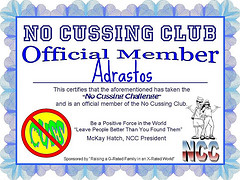Do tickets for cussing at school violate free speech?

This is an issue under consideration at the Maize Unified School District in Kansas. The policy allows police officers on campus to give students tickets if their language causes a “substantial disruption at school.” This sounds similar to the Tinker disruption test created by the Supreme Court in 1969. The tickets may result in a $50.00 fine. In the 2013 fall semester, four students were ticketed.
There are two issues to be considered here. First is the school’s right to maintain a safe learning environment for all students and staff. Courts have ruled that discipline may be imposed for disruptive speech – that is, speech that incites violence, for example, or encourages breaking the law. Speech that is contrary to the educational mission of the school may be regulated. That includes speech that promotes drug use, weapons on campus or sexual behavior.
The other side of this profanity ban is whether the school can criminalize such speech. There’s a difference between the school disciplining a student for cussing and law enforcement issuing a citation that brings the student into the legal system.
What do you think? Should a student be sent to juvenile court for swearing on campus? Also, how does one decide when there’s a “substantial disruption at school” due to a student’s language? Isn’t this a subjective decision?
In a somewhat related story, 22-year old, William Barboza received a speeding ticket in Connecticut. On the form sent in with his payment for the fine, he wrote some obscenities basically criticizing the government. He crossed out the word “Liberty” and wrote “Tyranny” in addition to another statement. For this act, he was arrested and briefly detained. He sued the town for violating his right to free speech and won in federal court in September, 2015.



